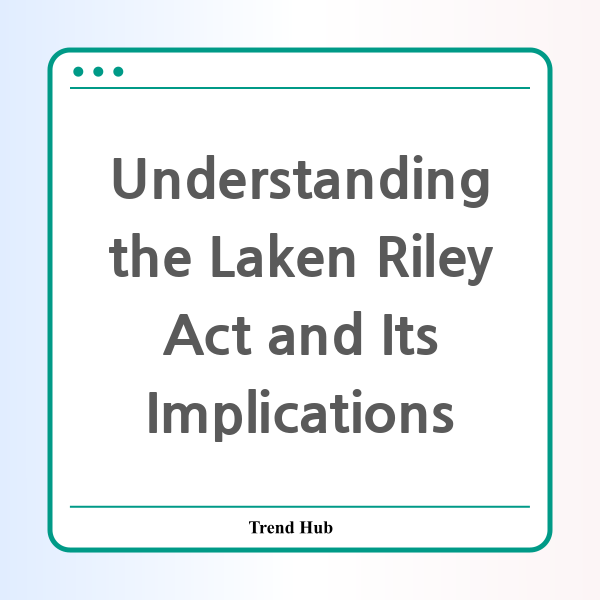* This website participates in the Amazon Affiliate Program and earns from qualifying purchases.

The Laken Riley Act is poised to become one of the first pieces of legislation sent to President Trump’s desk, reflecting a significant moment in U.S. immigration law. Named after Laken Riley, a 22-year-old nursing student whose tragic death at the University of Georgia sparked outrage and highlighted pressing concerns about illegal immigration, this bill carries heavy implications for the future of immigration enforcement in the United States.
As the dust settles from the recent elections and Trump assumes office for his second term, the Laken Riley Act represents both an immigration win for Republicans and a potential source of division among Democrats. But what exactly does the Laken Riley Act entail, and why is it generating such heated discussions in political circles?
Key Features of the Laken Riley Act
The Laken Riley Act primarily focuses on the treatment of illegal immigrants who commit specific crimes, such as theft, burglary, and assault. Notably, it mandates that Immigration and Customs Enforcement (ICE) detain these individuals until they are deported. With the backdrop of rising border crossings and a long-standing debate over immigration policy, this legislation seeks to reinforce the enforcement of existing immigration laws.
Among its provisions, the act also grants states the authority to initiate civil actions against federal government members who fail to uphold immigration laws. This aspect could potentially empower state officials to take matters into their own hands, a move that many see as both a necessary action for public safety and a concerning dilution of federal power.
In addition to these provisions, there is a proposed amendment known as "Sarah's Law," which would require ICE to detain illegal immigrants charged with serious crimes. This amendment illustrates the broader Republican agenda to prioritize stringent immigration enforcement in the wake of the Biden administration's perceived leniencies.
Political Implications
The introduction of the Laken Riley Act comes as Republicans are playing a strategic game to consolidate their gains in Congress. The bill is seen as a litmus test for the Democratic Party, revealing fractures within their ranks. With up to 11 Senate Democrats expected to cross party lines to support this legislation, the vote could highlight the growing divide on immigration policy.
The political stakes are high. For many Democrats, voting against the bill risks alienating a critical voter base concerned with immigration enforcement. Conversely, supporting the bill may alienate progressive members who advocate for more humane immigration policies. This dilemma presents a unique challenge as Democrats navigate their stance on immigration in an increasingly polarized environment.
Public Reaction and Future Prospects
The public reaction to the Laken Riley Act has been mixed. Supporters argue it is a necessary step toward ensuring public safety and holding illegal immigrants accountable for their actions. Critics, however, contend that it may lead to unjust deportations and fear-based tactics that disproportionately affect immigrant communities.
As the bill makes its way to the House for further debate, the upcoming discussions will likely signal the future direction of immigration policy in the U.S. under Trump’s administration. The Laken Riley Act could set a precedent for stricter immigration measures, and its passage may embolden further legislative efforts aimed at tightening immigration laws.
In conclusion, the Laken Riley Act stands at the intersection of public safety and immigration reform. Its implications extend far beyond the immediate legislative hurdles as it shapes the discourse surrounding immigration policy for years to come. As we watch the developments unfold, one thing is clear: the Laken Riley Act will be a critical piece of legislation that defines not only Trump’s second term but potentially the future of U.S. immigration policy.
* This website participates in the Amazon Affiliate Program and earns from qualifying purchases.